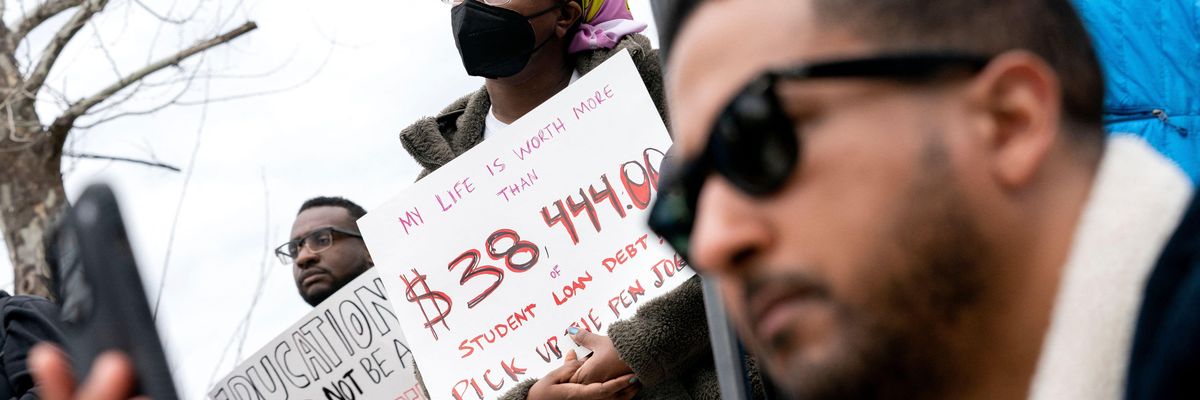

SUBSCRIBE TO OUR FREE NEWSLETTER
Daily news & progressive opinion—funded by the people, not the corporations—delivered straight to your inbox.
5
#000000
#FFFFFF
To donate by check, phone, or other method, see our More Ways to Give page.


Daily news & progressive opinion—funded by the people, not the corporations—delivered straight to your inbox.

People attend a rally to urge the Biden administration to cancel all federal student loan debt in Washington, D.C. on April 4, 2022. (Photo: Stefani Reynolds/AFP via Getty Images)
A survey out Thursday shows that more than half of student loan borrowers in the United States say they would not currently be able to make a single monthly debt payment if they were required to, a finding that comes amid mounting calls for universal student debt cancellation.
The new poll, conducted this month by the firm Payitoff, also finds that 64% of U.S. student loan borrowers say they "would not make a payment until they are legally required to do so." The average monthly student loan payment in the U.S. is $460, according to the Education Data Initiative.
The survey results were released weeks after the Biden administration announced its fourth extension of the federal student loan repayment moratorium, a freeze that has been in place since the beginning of the Covid-19 pandemic.
While advocates and progressive lawmakers welcomed the extension--which will remain in effect through August 31--they argued that continuing to push the end of the moratorium back several months at a time leaves tens of millions of borrowers in limbo and does nothing to ensure lasting relief.
"Pausing a crisis doesn't end it," the Debt Collective said earlier this month.
President Joe Biden has thus far dismissed calls to pursue sweeping student loan forgiveness via executive action, and his administration has yet to release a memo outlining whether he has the authority to do so. Legal experts and Democratic members of Congress have argued that Biden can cancel student debt unilaterally "with the stroke of a pen."
During a briefing earlier this month, White House Press Secretary Jen Psaki said that Biden "has not ruled out" broad-based student debt cancellation.
"I would note that, again, he would encourage Congress to send him a bill canceling $10,000 in student debt, something that he talked about looking forward to signing on the campaign trail," Psaki added.
Related Content

On Wednesday, the Government Accountability Office (GAO) released a report showing that the U.S. Department of Education "hasn't done enough to ensure that all eligible borrowers receive the forgiveness to which they are entitled" under income-driven repayment (IDR) plans, which are supposed to offer relief for low-income borrowers.
"We found thousands of borrowers still in repayment who could be eligible for forgiveness now," the GAO said.
The GAO report was published shortly after the Education Department (ED) announced it would be taking several steps to remedy "historical failures" in IDR plans and other federal student loan programs. The department said its policy changes "will result in immediate debt cancellation for at least 40,000 borrowers."
Persis Yu, policy director and managing counsel at the Student Borrower Protection Center, said in a statement that while the department's actions represent "a good first step," they don't "go far enough."
"Today's [GAO] report shows that problems with ED's data are so severe that as few as 4% of borrowers who manage to navigate IDR's complicated requirements have actually received the relief they are entitled to," Yu noted. "It defies logic to believe that such abusive practices are limited to one program. The problems identified suggest a much deeper systemic problem within the student loan system."
"We cannot rely on individual programmatic fixes to fix systemic problems," Yu added. "Widespread debt cancellation is needed immediately."
Dear Common Dreams reader, The U.S. is on a fast track to authoritarianism like nothing I've ever seen. Meanwhile, corporate news outlets are utterly capitulating to Trump, twisting their coverage to avoid drawing his ire while lining up to stuff cash in his pockets. That's why I believe that Common Dreams is doing the best and most consequential reporting that we've ever done. Our small but mighty team is a progressive reporting powerhouse, covering the news every day that the corporate media never will. Our mission has always been simple: To inform. To inspire. And to ignite change for the common good. Now here's the key piece that I want all our readers to understand: None of this would be possible without your financial support. That's not just some fundraising cliche. It's the absolute and literal truth. We don't accept corporate advertising and never will. We don't have a paywall because we don't think people should be blocked from critical news based on their ability to pay. Everything we do is funded by the donations of readers like you. Will you donate now to help power the nonprofit, independent reporting of Common Dreams? Thank you for being a vital member of our community. Together, we can keep independent journalism alive when it’s needed most. - Craig Brown, Co-founder |
A survey out Thursday shows that more than half of student loan borrowers in the United States say they would not currently be able to make a single monthly debt payment if they were required to, a finding that comes amid mounting calls for universal student debt cancellation.
The new poll, conducted this month by the firm Payitoff, also finds that 64% of U.S. student loan borrowers say they "would not make a payment until they are legally required to do so." The average monthly student loan payment in the U.S. is $460, according to the Education Data Initiative.
The survey results were released weeks after the Biden administration announced its fourth extension of the federal student loan repayment moratorium, a freeze that has been in place since the beginning of the Covid-19 pandemic.
While advocates and progressive lawmakers welcomed the extension--which will remain in effect through August 31--they argued that continuing to push the end of the moratorium back several months at a time leaves tens of millions of borrowers in limbo and does nothing to ensure lasting relief.
"Pausing a crisis doesn't end it," the Debt Collective said earlier this month.
President Joe Biden has thus far dismissed calls to pursue sweeping student loan forgiveness via executive action, and his administration has yet to release a memo outlining whether he has the authority to do so. Legal experts and Democratic members of Congress have argued that Biden can cancel student debt unilaterally "with the stroke of a pen."
During a briefing earlier this month, White House Press Secretary Jen Psaki said that Biden "has not ruled out" broad-based student debt cancellation.
"I would note that, again, he would encourage Congress to send him a bill canceling $10,000 in student debt, something that he talked about looking forward to signing on the campaign trail," Psaki added.
Related Content

On Wednesday, the Government Accountability Office (GAO) released a report showing that the U.S. Department of Education "hasn't done enough to ensure that all eligible borrowers receive the forgiveness to which they are entitled" under income-driven repayment (IDR) plans, which are supposed to offer relief for low-income borrowers.
"We found thousands of borrowers still in repayment who could be eligible for forgiveness now," the GAO said.
The GAO report was published shortly after the Education Department (ED) announced it would be taking several steps to remedy "historical failures" in IDR plans and other federal student loan programs. The department said its policy changes "will result in immediate debt cancellation for at least 40,000 borrowers."
Persis Yu, policy director and managing counsel at the Student Borrower Protection Center, said in a statement that while the department's actions represent "a good first step," they don't "go far enough."
"Today's [GAO] report shows that problems with ED's data are so severe that as few as 4% of borrowers who manage to navigate IDR's complicated requirements have actually received the relief they are entitled to," Yu noted. "It defies logic to believe that such abusive practices are limited to one program. The problems identified suggest a much deeper systemic problem within the student loan system."
"We cannot rely on individual programmatic fixes to fix systemic problems," Yu added. "Widespread debt cancellation is needed immediately."
A survey out Thursday shows that more than half of student loan borrowers in the United States say they would not currently be able to make a single monthly debt payment if they were required to, a finding that comes amid mounting calls for universal student debt cancellation.
The new poll, conducted this month by the firm Payitoff, also finds that 64% of U.S. student loan borrowers say they "would not make a payment until they are legally required to do so." The average monthly student loan payment in the U.S. is $460, according to the Education Data Initiative.
The survey results were released weeks after the Biden administration announced its fourth extension of the federal student loan repayment moratorium, a freeze that has been in place since the beginning of the Covid-19 pandemic.
While advocates and progressive lawmakers welcomed the extension--which will remain in effect through August 31--they argued that continuing to push the end of the moratorium back several months at a time leaves tens of millions of borrowers in limbo and does nothing to ensure lasting relief.
"Pausing a crisis doesn't end it," the Debt Collective said earlier this month.
President Joe Biden has thus far dismissed calls to pursue sweeping student loan forgiveness via executive action, and his administration has yet to release a memo outlining whether he has the authority to do so. Legal experts and Democratic members of Congress have argued that Biden can cancel student debt unilaterally "with the stroke of a pen."
During a briefing earlier this month, White House Press Secretary Jen Psaki said that Biden "has not ruled out" broad-based student debt cancellation.
"I would note that, again, he would encourage Congress to send him a bill canceling $10,000 in student debt, something that he talked about looking forward to signing on the campaign trail," Psaki added.
Related Content

On Wednesday, the Government Accountability Office (GAO) released a report showing that the U.S. Department of Education "hasn't done enough to ensure that all eligible borrowers receive the forgiveness to which they are entitled" under income-driven repayment (IDR) plans, which are supposed to offer relief for low-income borrowers.
"We found thousands of borrowers still in repayment who could be eligible for forgiveness now," the GAO said.
The GAO report was published shortly after the Education Department (ED) announced it would be taking several steps to remedy "historical failures" in IDR plans and other federal student loan programs. The department said its policy changes "will result in immediate debt cancellation for at least 40,000 borrowers."
Persis Yu, policy director and managing counsel at the Student Borrower Protection Center, said in a statement that while the department's actions represent "a good first step," they don't "go far enough."
"Today's [GAO] report shows that problems with ED's data are so severe that as few as 4% of borrowers who manage to navigate IDR's complicated requirements have actually received the relief they are entitled to," Yu noted. "It defies logic to believe that such abusive practices are limited to one program. The problems identified suggest a much deeper systemic problem within the student loan system."
"We cannot rely on individual programmatic fixes to fix systemic problems," Yu added. "Widespread debt cancellation is needed immediately."